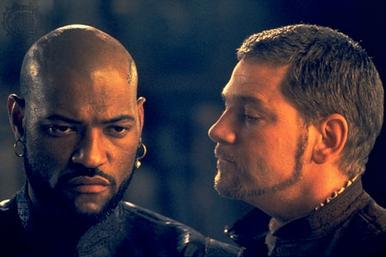
At first sight there isn’t much to connect Stephen King with Shakespeare – maybe even at second sight. But I was watching the BBC Othello yesterday when one of those ‘ermmm’ thoughts struck: Iago and Mr. Gaunt.
Mr. Gaunt, from King’s ‘Needful Things’, is unashamedly and unequivocally, a devil: ‘The Gaunt-thing hissed and shook its claws at them,” (pg 780 in my paperback version). He appears, however, a friendly, helpful, elderly man to almost all – delusion and reality.
Iago? Is he a devil or is he a man? Is he a human gone bad or a personification of evil? That’s one debate that’s not going to go away – but the unanswerability of the questions is key to the play – and as I keep trying to persuade people, Shakespeare’s greatness is in the questions he raises and not in any answers he doesn’t provide.
This is also the weakness of King – we get an answer - an ending (sort of happy) and a tag – it’s all starting again, which is so formulaic it is almost a sign of compulsive writing disorder. Evil is defeatable, the American dream is fightable for, small communities just need the right man to protect them, or else . . . blah, blah, blah.
Both Iago and Mr Gaunt work by constructing a false trail – trails that could, at first sight, seem simple jests – tricks and practical jokes which rely on the witless participation of others: King gives us Brian Rusk, Shakespeare, Rodrigo. Both use the weaknesses of their agents, but there is a difference in their victims.
Othello, Desdemona, innocents in black and white, do nothing to further their own destruction in the way Mr. Gaunt’s customers do – they do not, of their own free will, enter the shop. Iago is not playing with people’s bodies so much as with their souls: Whether he knows it is not at issue – he appears motivated by greed, jealousy and spite; he seeks Othello’s mental torture and physical destruction, not his soul’s damnation – but that is what Iago (almost?) achieves.
Gaunt is single-minded in his exploitation of a weakness in a culture – the pursuit of happiness at the expense of life and liberty. There is no chance of resisting because you have already made the choice – you are already damned and Gaunt simple takes you all the way. This dreadful inevitability is a criticism of American materialism and its pernicious effect on everyone from young children to religious leaders, from the town drunk to the town councillor. (Is this sounding as much like ‘sixties hippy’ to you as it is to me?)
At the heart of Shakespeare’s play is the impossibility of giving up free choice – no matter how many times you watch it, you think ‘ don’t believe him’, ‘don’t drink that extra cup’, ‘don’t . . .’: At no point is there an inevitability. Iago, right to the end, doesn’t think there is – in the final act he says he has either succeeded, or he hasn’t.
It seems to me that this is what makes Othello a tragedy – the possibility of an alternative.
It also seems to me to be the thing that makes Mr King’s book a Horror – the simple chain of cause and effect is inescapable.





1 comment:
The closest I've ever come to Stephen King was watching The Green Mile. I just find his sort of writing to be too tense, disconcerting - downright scary. It's a pty because I know he's supposed to be a fantastic writer, but I just can't appreciate it (similarly, I don't eat cheese - can't bear it - but I know there are thousands of superb dishes that feature it predominantly. I'm always dissappointed when I see them on a menu - something special I'll never get to enjoy.)
You do wonder what influences affect the imaginings of our great authors, don't you? I just finished reading 1984 and I keep wondering what the where Orwell got his first glimpse of Winston or O'Brien.
I think Kenneth Branagh was fantastic in that Othello. I think it's where I first sam him act (with Peter's Friends right after). It inspired me take Shakespeare to a higher level.
Post a Comment